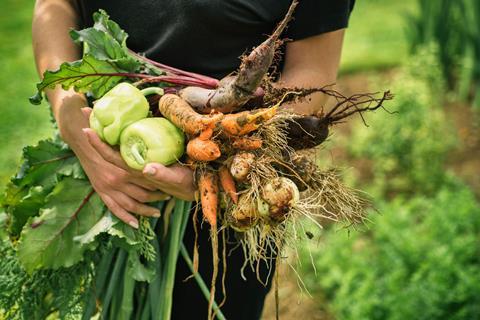Three major environmental organisations have outlined why the horticulture sector needs more support

The UK must stop relying on imports and fix diets by doubling the land used to grow fruit and vegetables using nature-friendly farming, according to a new report from environment charities.
The Soil Association, Sustain and The Wildlife Trusts have teamed up to call for farmers and growers to be given a fair deal and be put in the driving seat to deliver sustainable food security and healthy diets.
Launched on Wednesday 26 June at Groundswell farming festival, the report highlights the “vulnerability” of UK horticulture. It warns that public health will be further at risk if current trends continue and production declines further.
The charities have produced the report to raise the alarm over the fact that imports account for most of fruit and nearly half of veg consumed in the UK, while less than a third of people eat their Five a Day.
They call for government intervention to back sustainable, British farmers and growers, and for land used for horticulture in England to double. This would only be a small change to take it from 2 to 4 per cent of farmland, they say.
‘Fruit and veg in crisis’
Report co-author and Soil Association senior policy officer Lucia Monje-Jelfs said: “British fruit and veg is in crisis. Our diets are costing the NHS billions every year and the countries we import from are being hit by the impacts of climate change. We should be increasing our homegrown produce.
“But instead, many growers fear for the survival of their businesses and our fruit and vegetable consumption has fallen to the lowest level in half a century. If we scaled up agroecological horticulture, boosting access to healthy and sustainable food across the country, we could help to reverse the public health disaster, slash farming emissions, and restore wildlife. The next government must act to support the country’s growers.”
Working with nature
Agroecological systems, the charities say, should be prioritised to create a sector that works with nature rather than against it, relying on a healthy and resilient ecosystem instead of pesticides and artificial fertilisers.
The report calls for the next UK government to put more money into incentives for nature-friendly fruit and veg production, including organic, alongside tailored support for small-scale growers.
It also calls for farmers and growers to be supported through a shift away from farming on peat. The groups are urging government to invest in farmer-led research to support “sustainable and nature-friendly methods of farming on peat”, including finding crop varieties that can be grown in wetland conditions in paludiculture systems.
It will also be necessary to scale up production in other parts of the country with market gardens and field-scale horticulture, they say, including in areas that historically were important for fruit and veg like the Vale of Evesham.
Supporting growers and stimulating demand
Vicki Hird, strategic lead on agriculture for The Wildlife Trusts and co-author of the report, said: “Transforming our fruit and vegetable growing sector is vital for our health, climate, nature and for the precious lowland peat habitats that are currently destroyed by growing these products. We need to ensure we can grow more fruit and vegetables everywhere – and do this using sustainable methods that don’t harm the climate, and that work alongside nature using integrated pest management.
“Growers need to be supported in this period of change and must be treated fairly in the marketplace so that the transition to nature-friendly growing can happen for the long term.”
As well as doubling the land used to grow fruit and veg, the charities are also calling for action to boost consumption with government intervention to help create markets for British produce.
They call for an overhaul of public procurement so that schools and hospitals must prioritise homegrown fruit and veg from agroecological systems.
The asks also include government investment in local food hubs which support short supply chains and create accessible markets for smaller growers, including on the edges of towns and cities.
And the report calls for better fairness and flexibility in supply chains for farmers, most of whom cite supermarket pressure as the reason they fear for their business.



